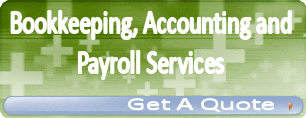Clearstone Bookkeepers and Accountants - Articles

Clearstone Bookkeepers and Accountants provide SME clients and new company start-ups with the very best bookkeeping and accounting services. We have a network of experienced bookkeepers across London and the UK. If you need a Bookkeeper in London then please call 0845 894 8979 for a quote.
Below you will find a selection of bookkeeping, accounting and business related articles that hopefully you may find useful.
Limited Company or Sole Trader?
There are advantages and disadvantages with starting a business either as a limited company or a sole trader.
Operating as a sole trader gives the advantage of requiring little in terms of administration. You must register as being self-employed with the Inland Revenue within the first three months of trading and you will pay Self Assessment Tax as well as national insurance. As a sole trader you are personally responsible for any monies owed to government or creditors and hence your personal assets including your home can be at risk.
There are a few reasons why forming a limited company may be the better option for you. Firstly, with a limited company there is “limited liability” to the company and hence in the event that the company struggles to pay its creditors and/or the government then the personal assets of the director(s) are not at risk.
Secondly, the perception of being a limited company tends to be better than that of being a sole trader. With a limited company there is a perception that the business is perhaps more serious, more professional, better managed and perhaps has longer term business objectives. It’s also believed that credit from banks or suppliers may more readily be offered to limited companies.
Taxation is also a consideration when deciding whether to form a limited company or operate as a sole trader. A limited company will pay corporation tax on all profits (after salaries) and for small companies this currently stands at 21% (on profits up to £300K) whereas a sole trader will pay income tax. The taxation advantages of a limited company come from flexibility in determining the proportions of salary paid and dividends paid, and the sole trader must pay income tax at the fixed thresholds. A limited company can pay dividends out of the company profits. Hence there are significant limited company tax advantages over a sole trader in the case where net income is less than the 40% upper earnings threshold. The limited company advantages increase where the net taxable profit amount is above the 40% upper earnings threshold for income tax, since the tax rate for limited companies and on dividends payments, is less than the 40% higher rate income tax rate.
The cost with producing sole trader accounts is less than with a limited company since with a sole trader there is no requirement for a formal accounting system and the production of a balance sheet is optional. With limited company accounts there are more statutory obligations and it is likely that you will need to enage an accountant who has all the required knowledge; this of course increases your annual costs.
There are also a few other financial differences relating to pensions, vehicles, donations and some other expenses which can be dealt with differently for accounting purposes for limited companies as with sole trader accounts. So the duties of a director of a limited company are more formal than those of a sole trader and your decision of which way to proceed may depend on your own particular circumstances. Many businesses start off as a sole trader and form a limited company after they have been trading for a while and this process is quite straightforward.
VAT Increase - Be Prepared
The rate of VAT in the UK increases from 17.5% to 20% as of 4th January 2011.
As the owner or director of a small or medium-sized business have you considered how this rise is going to impact upon you and your business?
What should you do?
The main alternatives are to either pass on the increase to your customers or let the business take the hit. There are pros and cons with both choices.
If you decide to let the business take the hit then you need to know how much effect this will have on your profits. More focus on sales and marketing activities to help boost your revenues would be advisable. You could contact an experienced bookkeeper to help you work out the impact on your profits and what level of extra sales would be required to cover the rise in VAT.
If you decide to pass on the VAT increase to your customers then you are protecting your current profit levels but customers never like price increases. If you increase the price then you run the risk of losing some customers to competitors. Some of your competitors may also increase their prices but some of them of course may not.
To keep a close eye on your business throughout the year it may be worth investing in the services of a good bookkeeping services company. They will be able to produce regular management accounts for you so you can always have an accurate picture of your business.
4 Key Tips To Avoid Business Failure
Running your own successful business is not easy and it's well known that around 50% of new start-ups don't make it beyond the first year of trading.
Therefore it's very important that you understand a few things to help your business to make progress and avoid failure.
Four key tips to help your business to avoid failure include:
1. Manage Your Cashflow Effectively
- Bad cashflow is the main reason why new businesses fail. You can keep on top of this by being organised and having systems in place to help. If you are not receiving payments on time from your customers then this can create big problems, when you need this money to continue trading.
- Hence you should have an organised invoicing system in place and follow up on late payments promptly. You should have a system that includes phoning the customer as well as sending reminder letters at set time intervals. You should also be prepared to use a debt recovery company once payments are well overdue.
- Also, be fully aware of what your expenditure is and when you need to make the payments by. Be aware of how much tax you need to pay and when this must be paid by.
2. Pay Staff and Suppliers in a Timely Fashion
- This goes hand in hand with managing your cashflow but it is important to pay your staff on time. Your staff are key to running your business and you must treat them fairly and keep morale high.
- Also, with suppliers if you pay late then you risk damaging your relationship with them. This may result in their services being withheld or your account being suspended which of course could affect your ability to trade as you need to.
- Therefore, you should be organised and be aware of when invoices are due for payment and pay them before they become overdue. You should also ensure that you always have sufficient funds for the staff wages.
3. Plan
- The saying "failing to plan is to plan to fail" is very true in business.
- If you have no plan and are trying to wing it as you go along then you really are fighting an uphill battle. You need to know the present situation of your business, what direction you want to head in and what results you are realistically expecting to achieve.
- Set goals and have timeframes in mind and review things regularly.
- A bookkeeping services company or experienced bookkeeper will be able to help you with all the planning, organisation and cashflow issues.
4. Market Your Business Effectively
- If you want to be able to sell your products or services to more and more customers then having a marketing plan is a good idea. To increase your revenues you'll need to either sell more and/or increase your margins and hence you need to be active in sales in marketing if you're going to succeed against your competitors. This will involve time and additional expense but you can't expect your business to grow and be successful if you don't look to actively gain new customers.
